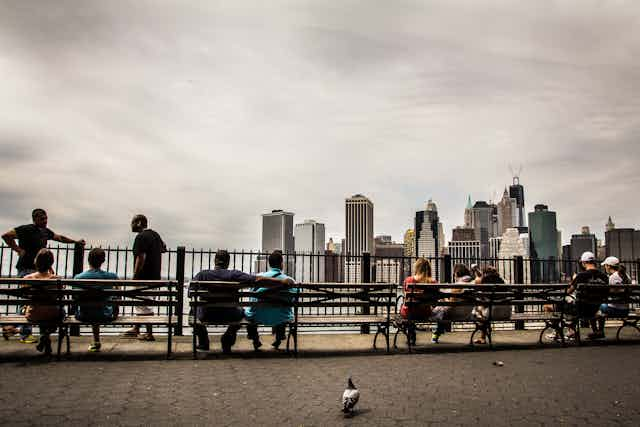The UN estimates that more than half of the global population currently live in cities, and this figure is expected to balloon to five billion urban inhabitants by 2030. In both developed and developing countries, the fast pace of urban growth often overwhelms existing housing and infrastructure. This in turn has led to an expansion of informal settlements, expensive rent, the growth of household debt and the consolidation of power and revenue with developers and landlords.
With these issues in mind, political leaders, academic experts, civil society organisations and community representatives from UN member states are meeting at the Habitat III conference in Quito, Equador, to develop strategies for managing an urban future, which they will define in the “New Urban Agenda”.
In general, the people and groups proposing solutions to these problems have access to certain forms of capital – not just economic, but also cultural or social, political, intellectual and natural capital. Each of these offers a way to exercise power and access resources, using means such as education, social connections, political popularity and natural resources. Access to any of these forms of capital can be a way of influencing the urban agenda and contribute solutions to the problems of the city.
Empowering politics
The redevelopment of existing communities and the construction of new urban areas is frequently funded by private companies looking to make a high return on investment. This is achieved by high-value sales or rental rates.
Without regulation, these processes create conditions that exclude or disempower poorer people within cities; for example, by limiting access to public spaces or making rent and home ownership unaffordable. One recent study revealed that, compared to other groups of people, poorer renters move more frequently into disadvantaged areas, each time experiencing a decline in their living standards.
Yet there are ways to avoid these outcomes: at the 2016 Urban Age conference, Barcelona mayor Ada Colau described her election as a way of leveraging political and social capital against financial capital. Strong social bonds between communities formed the background to her election, while grassroots campaigns against evictions and market forces in the city informed her mandate to govern.
Enhancing political capital is one way to challenge the urban agenda. To meet demand and solve overcrowding problems after World War I, the Vienna City Council pursued an aggressive development plan. Housing construction, levied by taxes rather than credit from the banks, would allow the council to limit rent to 4% of an indvidual’s income, without the problem of paying off debt. To this day the city is lauded for its housing affordability and livability and a number of incentives for financing affordable rental properties.

As part of the original plan, the hundreds of buildings – called as “Wiener Gemeindebauten” – were constructed with kindergartens, clinics, libraries, laundries, parks and other public facilities. These facilities were not just convenient; they also improved the social capital of residents, giving them access to the amenities and services they needed to improve their lives and those of their children.
Power to the people
Social capital is another means of empowering people to influence the urban agenda. While banks and real estate analysts like measurable outcomes, many features of urban communities – such as a sense of beauty, belonging or safety – may be intangible and unquantifiable.
Take, for example, a low-income community at Parque do Gato in Sao Paolo, which benefited from beautification strategies such as mural making. These efforts increased the community’s visibility in the city, which made it less vulnerable to removal.
This accords with statements made by Nigerian architect Kunye Adayemi at the Urban Age conference. When the community of Makoko in Lagos was labelled an “eyesore” by the government and earmarked for demolition, his intervention – a floating school made from local materials – empowered the community with an identity that attracted media interest and enhanced its stability.

There’s also clear evidence in favour of consulting the communities which are expected to use these housing or urban developments. Ideally, methods such as “social design” or “community engaged design” lead to plans which are specific to the community and its unique circumstances.
As a study on the Wall of Remembrance by the University of Barcelona found, better consultation and involvement of communities in new projects greatly improves results. By offering people greater ownership over, and participation in, these developments, it’s more likely that they will accept and use them properly.
Different types of capital don’t necessarily have the same power to affect change. But when poorer people and communities exercise their social capital, it increases their capacity to negotiate with powerful state and market forces and improve their lives. For example, the Local Well-being Project – a partnership between The Young Foundation, the LSE and local authorities – reported higher well-being in three different areas in England where residents had the confidence to exercise control over local affairs.
People with access to capital will be most emboldened to influence the urban agenda on behalf of others. This capital takes many forms – intellectual, financial, social and political. For low income earners and vulnerable groups who may lack access to other forms of capital, access to social capital can be improved through consultation and thoughtful urban design. As cities grow, it’s crucial to consider intangible benefits such as beauty, community and safety, instead of having a narrow focus on short-term profit.

